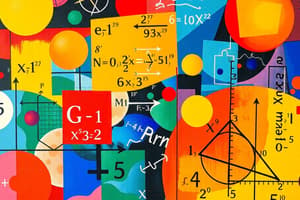Podcast
Questions and Answers
What is the primary focus of arithmetic?
What is the primary focus of arithmetic?
- Analyzing shapes and angles
- Understanding relationships between quantities
- Solving equations
- Basic operations such as addition and multiplication (correct)
Which mathematical branch extends simple arithmetic concepts by introducing variables?
Which mathematical branch extends simple arithmetic concepts by introducing variables?
- Calculus
- Geometry
- Statistics
- Algebra (correct)
Which concept is NOT typically associated with geometry?
Which concept is NOT typically associated with geometry?
- Circles
- Angles
- Polygons
- Derivatives (correct)
What does differential calculus primarily deal with?
What does differential calculus primarily deal with?
Which area of mathematics deals with analyzing data and predicting outcomes?
Which area of mathematics deals with analyzing data and predicting outcomes?
Which type of reasoning involves identifying patterns and making predictions?
Which type of reasoning involves identifying patterns and making predictions?
What is a key step in problem-solving strategies?
What is a key step in problem-solving strategies?
Which application of mathematics is primarily concerned with the study of numbers and their properties?
Which application of mathematics is primarily concerned with the study of numbers and their properties?
Flashcards
Mathematics
Mathematics
A system of logic used to quantify and describe the world.
Arithmetic
Arithmetic
The branch of mathematics focused on basic operations: addition, subtraction, multiplication, and division.
Algebra
Algebra
Expands arithmetic with variables to form equations and analyze relationships.
Geometry
Geometry
Signup and view all the flashcards
Calculus
Calculus
Signup and view all the flashcards
Statistical Analysis
Statistical Analysis
Signup and view all the flashcards
Logical Deduction
Logical Deduction
Signup and view all the flashcards
Problem-Solving Strategies
Problem-Solving Strategies
Signup and view all the flashcards
Study Notes
Fundamental Concepts
- Mathematics is a system of logic and reasoning used to quantify, measure, and describe the world around us.
- It uses symbols and rules to represent and manipulate abstract concepts.
- Core branches include arithmetic, algebra, geometry, and calculus.
- Key principles include axioms, theorems, and proofs.
Arithmetic
- Focuses on basic operations: addition, subtraction, multiplication, and division.
- Includes concepts like place value, prime numbers, factors, and multiples.
- Fundamental for understanding more advanced mathematical concepts.
- Utilizes algorithms for efficient calculations.
Algebra
- Extends arithmetic by introducing variables and equations.
- Focuses on relationships between quantities.
- Involves solving equations, manipulating formulas, and analyzing patterns.
- Includes concepts like linear equations, quadratic equations, and systems of equations.
Geometry
- Deals with shapes, angles, and their spatial relationships.
- Covers topics like points, lines, planes, polygons, circles, and solids.
- Includes formulas for area, perimeter, volume, and surface area.
- Uses visualization and spatial reasoning.
Calculus
- Deals with change and motion.
- Includes differential calculus (rates of change) and integral calculus (accumulation of quantities).
- Fundamental for understanding complex systems in physics, engineering, and other fields.
- Uses concepts like derivatives and integrals.
Additional Mathematical Areas
- Statistics and probability—analyzing data and predicting outcomes.
- Discrete mathematics—dealing with countable objects, graphs, and algorithms.
- Number theory—studying properties of numbers.
- Linear algebra—dealing with vectors, matrices, and linear transformations.
- Set theory—dealing with collections of elements.
Problem-Solving Strategies
- Identifying the problem
- Organizing information
- Creating a plan
- Executing the plan
- Evaluating the results
- Communicating the solution
- Checking for errors
Mathematical Reasoning
- Logical deduction—drawing conclusions based on established facts.
- Inductive reasoning—identifying patterns and making predictions.
- Abductive reasoning—formulating hypotheses based on observations.
- Critical thinking—examining assumptions and evaluating evidence.
Applications of Mathematics
- Science (physics, chemistry, biology)
- Engineering (civil, mechanical, electrical)
- Computer science
- Finance
- Economics
- Statistics
Studying That Suits You
Use AI to generate personalized quizzes and flashcards to suit your learning preferences.




